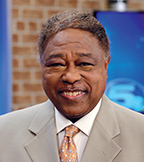(Source: The Philadephia Sunday)
MOBILE, Ala — Alabama broadcaster Mel Showers, who broke racial barriers in a Deep South newsroom and became a beloved and trusted newsman along the state’s Gulf Coast, has died. He was 78.
WKRG-TV, the station where he worked for 50 years, announced his death over the weekend. The station did not release the cause of his death.
When he became an on-air reporter in 1974, Showers was one of the first Black journalists on television in his native Mobile. He began co-anchoring the morning news in 1981 and became an evening news anchor in 1990.
“He broke many barriers and won over the hearts and minds of every household on the Gulf Coast,” WKRG-TV General Manager Jesse Grear said in an article announcing Showers’ death
Showers told WKRG in 2019 that as a boy he watched news anchors, such as Walter Cronkite, and wondered if he could do that one day. But he said he “couldn’t look at that realistically because I didn’t see any dark-skinned people on the air doing that.”
His chance came in 1969 when he began doing work at the station as a booth announcer, reading station announcements. By 1974, he was appearing on the air as a reporter. The station said he covered racial inequity in Mobile’s police and fire departments, Hurricane Frederic in 1979, and the 1981 lynching of teenager Michael Donald by the Ku Klux Klan. He moved to the anchor desk in 1981.
Showers said he always had the support of the station and the Black community, but some were not happy with his presence on air.
“Those early years, when the hate mail would come in, not quite used to and not quite ready for a person of my complexion to hit that air, but I kept smiling,” he said during his 2015 induction into the Alabama Broadcasters Hall of Fame.
He kept doing his job and came to feel acceptance.
“It started to catch on with the viewing public, hate mail changed to fan mail,” Showers said, according to his induction announcement.
Showers retired in 2019.
“He was on the vanguard when it came to being a news anchor,” said Bob Grip, who worked with Showers at WKRG in the early 1970s before Grip became a longtime anchor at rival WALA-TV.
Grip said that Showers told every story right down the middle.
“As a result, he earned the respect of everyone in the community, and that stayed with him, whether he was a reporter, or when he rose to be an anchor,” Grip said in a telephone interview.
Rep. Barbara Drummond, a state legislator and former reporter with the Mobile Press-Register, said Showers was an inspiration to her and other young journalists and to young people of color.
“To see him on TV gave little Black and brown girls the aspiration that no matter where they grew up at, no matter what their zip code was, they could aspire to go to higher heights,” Drummond said.
She said Showers was the epitome of “hard work, due diligence and being an honest person.” Drummond said that Showers had a reputation for dealing in facts without sensationalism:
“Many, many times people would say, ‘Did you hear what Mel Showers said? That’s got to be true because Mel said it.’”

